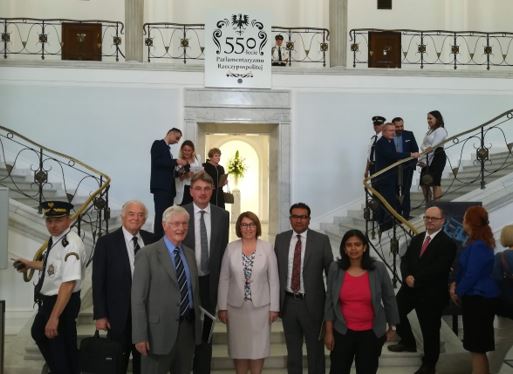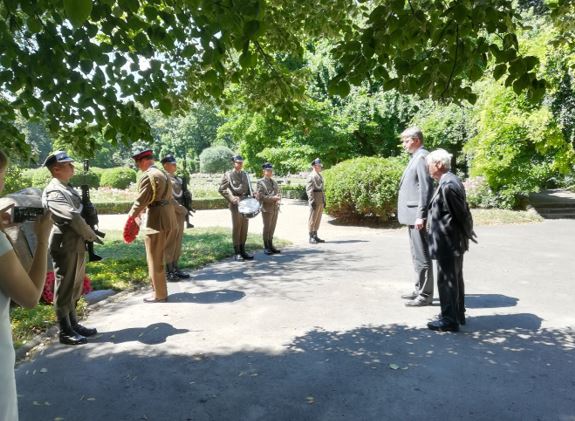

APPG Poland underscore commitment to a vital relationship for UK
This was the first Parliamentary delegation that I have had the privilege of leading to the Republic of Poland. I am hoping that this will just be the first in a series of visits that the All-Party Parliamentary Group will undertake. Bringing members from both the House of Commons and Lords is vitally important in order for them to get a first-hand account and understanding of the issues of the day. In an era of fake news the old adage that “A lie can travel halfway around the world while the truth is still putting on its shoes” holds true and for Parliamentarians to go themselves to a country to gain a better perspective of the situation in the country is vital. This is particularly important for a country such as Poland at the present time which is taking up a number of our Western media pages with its constitutional reforms. With the backdrop of the reforms, Brexit, Europe’s migrant crisis and the re-emergence of Russia as a threat to Nato, the trip was timely, very interesting and immensely valuable.
Apart from the difficulties presented by the Cold War period, Britain and Poland have a strong history of friendship and co-operation. Even during the cold war, Poland was said by Britain’s intelligence network to be “the most unreliable member of the Warsaw Pact’ and would it was hoped come on Nato’s side in the event of a war with the Soviet Union. The relationship between the two countries has its roots sowed in the Second World War, the history of which the people of Poland are acutely aware of. The invasion of Poland was, of course, the reason for Britain’s declaration of war on Germany. Understanding the scar which the Second World War and the subsequent communist Government left Poland with is vital if one is going to get to grips with the Polish psyche. Many decisions even now have their foundation in the outcome of WW2.
Every Pole that we met welcomed the strong relations that our two countries share and many knew a lot about Britain and had either worked or studied in our country or had relatives that were doing so. In recent years ties have grown closer as over a million Poles moved to Britain since its accession to the EU in 2004. Unlike many other EU countries that prevented Poles moving to their countries for a number of years, Britain did not. A factor which encouraged such a large migration to Britain.
Attending the visit I had two Labour MPs, Rupa Huq & Faisal Rashid, both of whom had never visited Poland previously but shared a strong interest in the country and its diaspora. Rupa represents Ealing Central and Acton which has a large Polish population and the deputy Foreign Minister Adrzej Papierz, whom we met with, joked that Ealing is seen as the 17th Voivodeship (region). Faisal is also involved with the Polish Community in his constituency but also has a strong interest in improving bilateral trade as he sits on the Trade Select Committee. Two experienced Lords joined the delegation, Lord Balfe of Dulwich who sat in the European Parliament for 25 years along with Lord Wallace of Saltaire who was Government spokesperson in the Lords for the Foreign and Commonwealth office.
Throughout the trip a number of common themes emerged. Poland values its close relationship with the UK and has seen the British Government as a strong strategic partner within the EU, many mentioned that it was with regret that we were leaving and feared the loss of an ally in this respect. Everyone mentioned that they wished for a strong relationship to continue post-Brexit. In fact, many made mention that the relationship was growing further, highlighting the success of the Belvedere Forum, the UK – Poland Quadriga joint communiqué on strengthening foreign, defence and security partnerships. During our meeting with the Committee for Polish Diasparo there was a common consensus from the Polish side that they had been impressed with the way the British Government had reacted to incidents of hate crime after the EU referendum vote and that moves to reassure the Polish Diaspora in the UK that they were welcome to stay were promising.
The Polish politicians and business leaders we met generally viewed its membership of the European Union favourably, but they were not unconcerned by what the future holds for their country’s membership. There has been recent friction over constitutional reform in the country, something the EU has been challenging Poland over, as well as apprehension about the fact that they may soon become a net contributor to the EU budget, as opposed to a net recipient, a date which has been brought forward with Britain no longer paying into the budget in future. The spending proposals for the new EU budget also raised some unease as it will see a reduction in agricultural payments, as well as the possibility for Member State that the EU feels, are acting in a wayward manner to see a temporary reduction in payments.
Poland and its people are acutely aware of their history and are sensitive to it. Under communism, much of the Second World War could not be discussed and this led to an even greater need to tell its story and remind the world of the suffering that it was victim to. They also keen to point out there bravery and triumphs. We visited the Warsaw Uprising Museum and laid a wreath at a memorial for Allied aircrews who lost their lives dropping aid during the Uprising against the brutal Nazis. The citizens of Poland have the world’s highest count of individuals who have been recognized by Yad Vashem of Jerusalem as the Polish Righteous Among the Nations, for saving Jews from extermination during the Holocaust in World War II. Acutely aware of the horrors that took place in their country under occupation, they are sensitive to any suggestion they as a nation played a part in it or that they are specifically Polish death camps. They are, of course, Nazi death camps. This is the grounding in the recent law which seeks to penalise public accusations against Poland, which are contrary to the facts, of responsibility or complicity in Nazi German crimes.
Security ties were mentioned numerous times and an increasingly more assertive Russia is clearly a worry for a country that shares a border. Again, living history of occupation and communist rule are a fresh reminder as are Russia’s recent advances in Ukraine and South Ossetia of the history of aggression. There was praise for the new joint UK-Poland Treaty on Defence and Security Co-operation which was signed late last year at the UK-Poland bilateral summit. However, there was uncertainty on the Polish side as to whether it had enough substance and a clear keenness for further and greater co-operation. This mainly came in the form of a request for greater troop numbers and permanent NATO base east of Warsaw.
The Polish economy is enjoying a strong period of growth. Ever since the fall of communism, the country has witnessed a quarter of a century of steady economic growth. During the two years after the financial crisis, it posted positive growth figures which were perhaps only dampened by its interdependence to its neighbours. 2017 was her best year since 2011 with GDP growth reaching 4.6pct.
The delegation visited the Polish Constitutional tribunal to hear from its President Julia Przylebska (since December 2016) who explained why she believes the recent reforms which saw judges retired in both the Constitutional tribunal and the Supreme Court were justified. In 2017 the Polish government passed a law which would’ve forced all Supreme Court judges into mandatory retirement apart from those granted an extension by the Minister of Justice. However, following mass protests against the bill it was ultimately vetoed by President Andrzej Duda on July 24, 2017. A revised law was drafted which reduced mandatory retirement ages from 70 to 65. This was passed by the Polish Sejm and meant that 40% of the judges including its President Malgorzata Gersdorf would be forcibly retired and the day before our visit on the 4th of July 2018 President Gersdorf was scheduled to retire but she had turned up to work in defiance of the law. The President Malgorzata Gersdorf explained that she felt it was important to appoint new judges because many had operated under communism and there are cases where judges had put members of political opposition groups into prison.
Finally, it was immensely encouraging to meet such a broad spectrum of politicians with different political backgrounds during our visit, whether it was meetings in the Senate or the Sejm we were greeted by Members from all parties with a multitude of different opinions but many shared values.
This delegation came to the country at a pertinent time. During a period when Poland is coming under increasing pressure from not just Brussels but Washington and Jerusalem as well. The APPG was able to ensure our Polish counterparts knew of the United Kingdoms’ gratitude for their friendly voice during the Brexit process as well as assure them of our commitment to them, their diaspora and our longstanding friendship.













